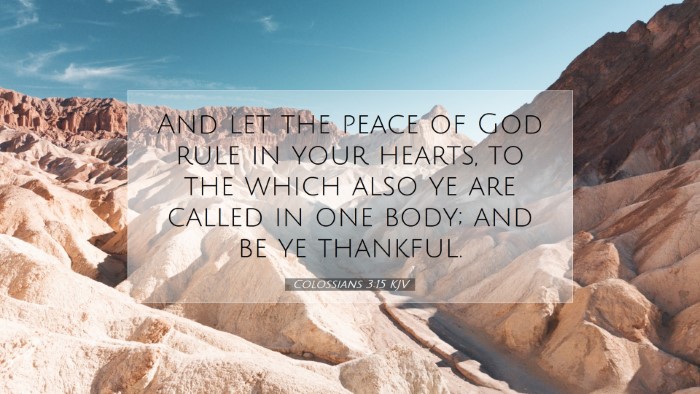Commentary on Colossians 3:15
Verse: "And let the peace of God rule in your hearts, to the which also ye are called in one body; and be ye thankful."
Colossians 3:15 is a pivotal verse in Paul's epistle to the Colossians, encapsulating key theological and practical insights for believers. This commentary synthesizes the observations of several prominent public domain commentaries to provide a comprehensive understanding of the text.
Contextual Overview
This verse falls within a section where Paul instructs the church on various aspects of Christian living. Having established the supremacy of Christ and the believer's identity in Him, Paul shifts to practical exhortations that reflect a life transformed by the Gospel.
Exegesis of the Verse
The Peace of God
Matthew Henry emphasizes that the "peace of God" refers to the tranquility and harmony that comes from God, which should be the ruling factor in the life of a believer. This peace is not merely an absence of conflict but a profound sense of wholeness and well-being that transcends earthly troubles.
Adam Clarke further explains that this peace is linked to the reconciliatory work of Christ, who brings believers into harmonious fellowship with God and one another. This context of reconciliation informs believers about the nature of their relationships within the church.
Rule in Your Hearts
The term "rule" suggests an exercise of authority. Here, Albert Barnes notes that the peace of Christ should act as an umpire in our hearts, deciding conflicts and guiding decisions in alignment with God's will. This concept indicates that peace is an essential indicator of spiritual health; when hearts are ruled by peace, believers demonstrate Christ-like behavior in their interactions with one another.
Matthew Henry reinforces this idea, suggesting that when peace is the dominant influence in our lives, it aids in resolving disputes and fosters unity within the body of Christ. Thus, maintaining peace should be a priority for the community of believers.
Called in One Body
Paul’s mention of being "called in one body" serves to highlight the collective nature of Christian faith. Albert Barnes elucidates that this calling signifies not only individual salvation but also the communal aspect of the Christian faith. Believers are united in Christ, and this unity should be reflected in their interactions.
Adam Clarke posits that this unity underscores the importance of mutual support and love among believers. The peace of Christ fosters an environment where members of the church care for one another, promoting edification and encouragement instead of division.
Be Ye Thankful
Concluding the verse is a call to gratitude. Matthew Henry states that thankfulness is not merely a natural response but a deliberate mindset that acknowledges God’s providence and grace in all situations. A gracious heart is fundamental to a believer’s relationship with God and others, reinforcing the exhortation to live in peace.
Albert Barnes identifies thankfulness as an essential aspect of the Christian life. It fosters a spirit of humility, reminding believers of their dependence on God for all things. This attitude can transform interactions, leading to an atmosphere of unity and encouragement within the church.
Theological Insights
Colossians 3:15 offers profound theological insights that impact various areas of church life and individual conduct among believers.
- Peace as a Divine Gift: The peace mentioned is a gift from God, which believers must actively cultivate in their lives, recognizing that it is sourced in their relationship with Christ.
- The Role of Community: The verse emphasizes the communal aspect of Christianity, where personal faith is expressed in relational harmony within the body of believers.
- Gratitude as a Christian Virtue: Thankfulness emerges as a key virtue that not only enhances personal piety but also enriches communal life.
Practical Applications
For pastors, students, and theologians, Colossians 3:15 serves several practical purposes:
- Conflict Resolution: When engaging in ministry, leaders should prioritize peace, allowing God's peace to mediate disputes and foster reconciliation.
- Encouraging Community: Sermons and teachings should emphasize the importance of the collective body, promoting initiatives that build unity and cooperation among members.
- Fostering a Thankful Spirit: Regularly cultivating an attitude of thankfulness can be incorporated into worship practices, encouraging congregations to articulate gratitude publicly and privately.
Conclusion
Colossians 3:15 challenges believers to live out their faith in a way that embraces peace and unity, ultimately reflecting the character of Christ. This verse serves as a reminder that our individual faith journey is intricately connected to our community life as followers of Christ. Pastors and church leaders should strive to create a culture of peace and thankfulness, ensuring that the church stands as a testament to God's transformative power in a world often marked by division and strife.


